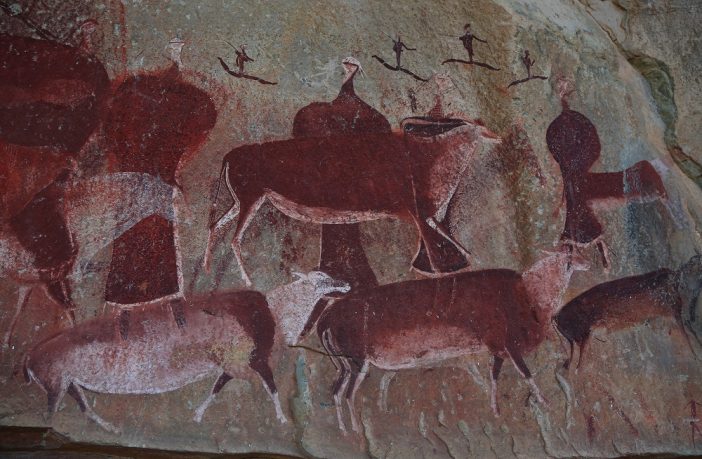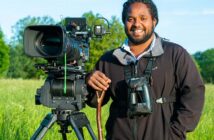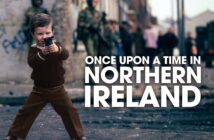The new landmark BBC series, Civilisations, co-produced by The Open University, is set to bring history and art to life in a stunning piece of television.
Presenters Simon Schama, Mary Beard and David Olusoga travel the globe to examine dazzling works of art and history – helping us to re-examine our own place in the world, at a time when much of global politics is unsettling.
Mooted as the successor to Kenneth Clark’s TV series Civilisation, which was broadcast in 1969, the new series goes far beyond this to uncover beautiful artefacts that tell us more about many and varied civilisations of the past and present.
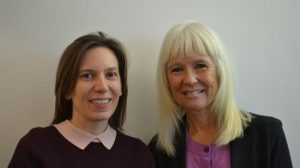
OU Academic consultants Kathleen Christian & Gill Perry
Professor Gill Perry has been involved in the co-produced series for The Open University, and explains why ‘civilisation’ as a term remains controversial. She says:
“This new nine-part series takes a sweeping, global perspective that goes far beyond the original.
“While Clark’s Civilisation TV series in 1969 took a ‘Western’, Eurocentric perspective, this new series (titled in the plural with an ‘s’) explores multiple civilisations that emerged independently in places and periods across the world. As is suggested by the presenters, the word ‘civilisation’ is slippery and contested.”
Professor Perry explained that the term civilisation has its origins in classical Latin, where the term ‘civis’ meant a citizen of the Roman Empire, and was used in contrast to the ‘barbarians’ outside its borders.
“Controversial”
Since then it been used to refer broadly to complex societies which have developed into centralised, urbanised and stratified structures. That said, one of its most controversial, historical meanings is the use of civilisation to indicate a so-called ‘advanced’ culture in contrast to supposedly more ‘primitive’ ones. This association, which underpins some established colonial attitudes about ‘civility’, is explicitly challenged in many of the programmes in this series.
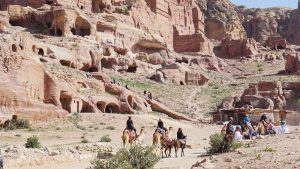 The series includes stunning footage of many art works, artefacts and their different global contexts and meanings.
The series includes stunning footage of many art works, artefacts and their different global contexts and meanings.
For example, Simon Schama compares the possible meanings of a series of architectural domes, from Hagia Sophia and the Süleymaniye mosque in Istanbul, to St Peters in Rome.
David Olusoga explores different artistic reactions to Imperialism, ranging from representations of “native Americans” and New Zealand Maoris, to the pursuit of “non-Western” art by artists Gauguin and Picasso.
The presenters draw out the essence of what images do, the roles they continue to play in different cultures, and what they can tell us about civilisations.
Dr. Kathleen Christian, who collaborated with Gill Perry as OU consultant on the series, continued:
We come away with a richer and more complex notion of what ‘civilisation’ might mean than Clark’s legacy.
Civilisations pays homage to Kenneth Clark’s original series and the Western artistic tradition, but also expands the original scope by considering how civilisations develop out of the interaction between cultures, and by focusing attention on stunning works of art from across the globe.’
Vice-Chancellor of The Open University, Peter Horrocks, said:
Civilisations takes multiple viewpoints. It celebrates the dazzling variety of human cultures, bringing them vividly to life. It identifies creativity in the intersections and clashes between civilisations.
Civilisations begins with the first episode, The Second Moment of Creation on Thursday March 1 looking at the formative role art and the creative imagination have played in the forging of humanity itself.
Free poster offer from The Open University
To accompany the Civilisations series, The Open University has also produced a stunning poster representing many of the objects from around the world that are featured in the programmes. To order your free poster go to http://www.open.edu/openlearn/civilisations#order-your-free-poster.
New Open University courses link to this series
The Open University has been working with the BBC to produce a vivid new series that relates directly to our new and developing Art History Curriculum, its digital platforms and outreach projects.
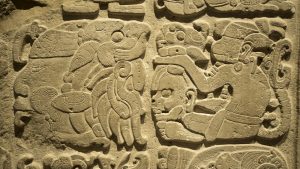 The exciting new third level art history course launched this year – Art and its Global Histories – explores in depth many of the issues explored in this TV series. It covers art from the early modern period to the present from a global perspective, looking at many of those cultural encounters featured in the BBC series.
The exciting new third level art history course launched this year – Art and its Global Histories – explores in depth many of the issues explored in this TV series. It covers art from the early modern period to the present from a global perspective, looking at many of those cultural encounters featured in the BBC series.
Other online assets include films made by OU academics that provide detailed analysis of many of the objects featured in this BBC series, such as the Openlearn resource Travelling Objects http://www.open.edu/openlearn/travellingobjects and our Open Arts Objects archive
(http://www.openartsarchive.org/open-arts-objects.
Join in the discussion
Civilisations begins with the first episode, The Second Moment of Creation on Thursday March 1 at 9pm on BBC2, looking at the formative role art and the creative imagination have played in the forging of humanity itself. Join the debate afterwards at our online discussion hub, where Open University academics will be posting questions and responding to your questions and thoughts.
http://www.open.edu/openlearn/history-the-arts/history-art/civilisations-the-debate
Supporting the series is a touring festival, in museums and art galleries around the UK. BBC have the link through to the Festival – http://museumcrush.org/civilisations-festival/
Civilisations was commissioned for the OU by: Dr Caroline Ogilvie
- Academic Consultants: Prof Gill Perry & Dr Kathleen Christian
- Media Fellow: Dr Chris Williams
- Broadcast Project Manager: David Bloomfield
- Online Project Producer: Georgia Axtell-Powell
Civilisations is produced by the BBC and Nutopia in partnership with The Open University and in association with PBS. The Executive Producers are Jonty Claypole and Mark Bell for the BBC, and Denys Blakeway and Michael Jackson for Nutopia. The Series Producers are Melanie Fall and Ian MacMillan. Bill Gardner, VP of Programming and Development, will oversee the project for the PBS version of the project.
